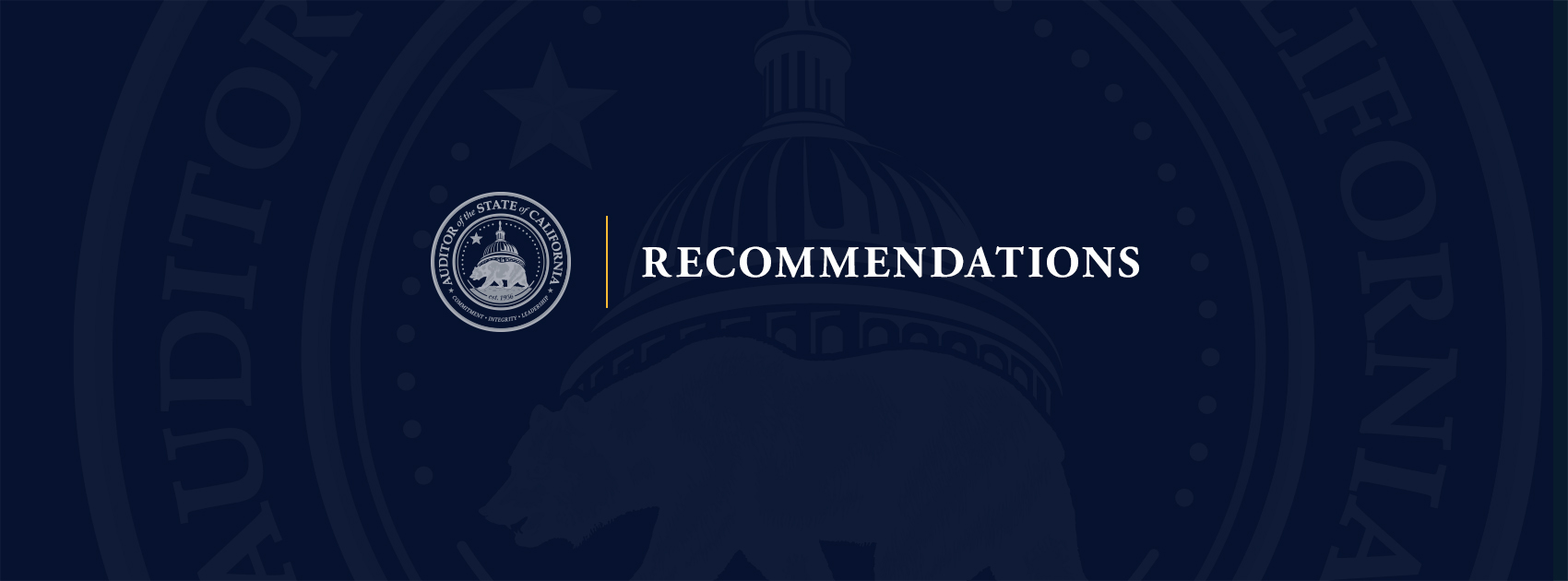
2023-116 Local Cannabis Permitting
Cities and Counties Can Improve Their Permitting Practices to Bolster Public Confidence
Published: March 28, 2024Report Number: 2023-116
Audit Recommendations Disclosure
When an audit is completed and a report is issued, auditees must provide the State Auditor with information regarding their progress in implementing recommendations from our reports at three intervals from the release of the report: 60 days, six months, and one year. Additionally, Senate Bill 1452 (Chapter 452, Statutes of 2006), requires auditees who have not implemented recommendations after one year, to report to us and to the Legislature why they have not implemented them or to state when they intend to implement them. Below is a listing of each recommendation the State Auditor made in the report referenced and a link to the most recent response from the auditee addressing their progress in implementing the recommendation and the State Auditor’s assessment of auditee’s response based on our review of the supporting documentation.
To all local jurisdictions
Recommendation 1
To prevent favoritism, ensure fairness, and reduce the risk of corruption, all local jurisdictions that permit or plan to permit cannabis businesses should adopt or amend ordinances or policies and procedures to implement the following processes:
- Consider requiring blind scoring as an additional safeguard for competitive permitting processes. Blind scoring involves removing any identifying information about an applicant from application materials before a review.
- Create an appeals process to allow applicants to appeal the denial of their permit application to an impartial decision-maker.
- Require that all individuals involved in reviewing cannabis applications sign impartiality statements or similar documents, asserting that they do not have personal or financial interests that may affect their decisions. In the interest of transparency, consider making the signed impartiality statements or the language used in the impartiality statements available to the public by potentially posting it to the jurisdictions’ websites.
- Require that designated staff at the local jurisdictions review impartiality statements to ensure that staff who review applications do not have personal or business interests that may affect their decisions.
- Require separation of duties or another layer of approval in the permitting process that prevent one person from exercising control over the decision to award a permit.
Status
pending
Recommendation 2
To help protect public health and safety, all local jurisdictions that permit or plan to permit cannabis businesses should adopt or amend ordinances or policies and procedures to implement the following processes:
- Require the relevant law enforcement office or other relevant department to certify that all individuals passed background checks by providing a letter or other documented notification to the cannabis-permitting office, confirming the individuals’ names and whether they passed the background checks. The cannabis-permitting office should keep a record of this letter or other written notification confirming that individuals passed the required background checks.
- Create a tracking and documentation process for verifying that applicants submitted a complete application. If the application is not complete, the jurisdiction should promptly notify the applicant so that the applicant can provide any missing information. The local jurisdiction should not issue a permit until it verifies that all information is complete.
Status
pending
Recommendation 3
To increase the transparency of the cannabis-permitting process for potential applicants and for the public, all local jurisdictions that permit or plan to permit cannabis businesses should adopt or amend ordinances or policies and procedures to implement the following processes and best practices observed at several of the local jurisdictions we reviewed:
- Publish permit-related ordinances, permit information, and permit application forms on the relevant public website.
- Create supplemental communications about the cannabis-permitting policies and procedures, such as step-by-step guides and frequently asked questions.
- Develop a web application through which applicants can apply.
- Publish cannabis-related fees on the relevant public websites.
Status
pending